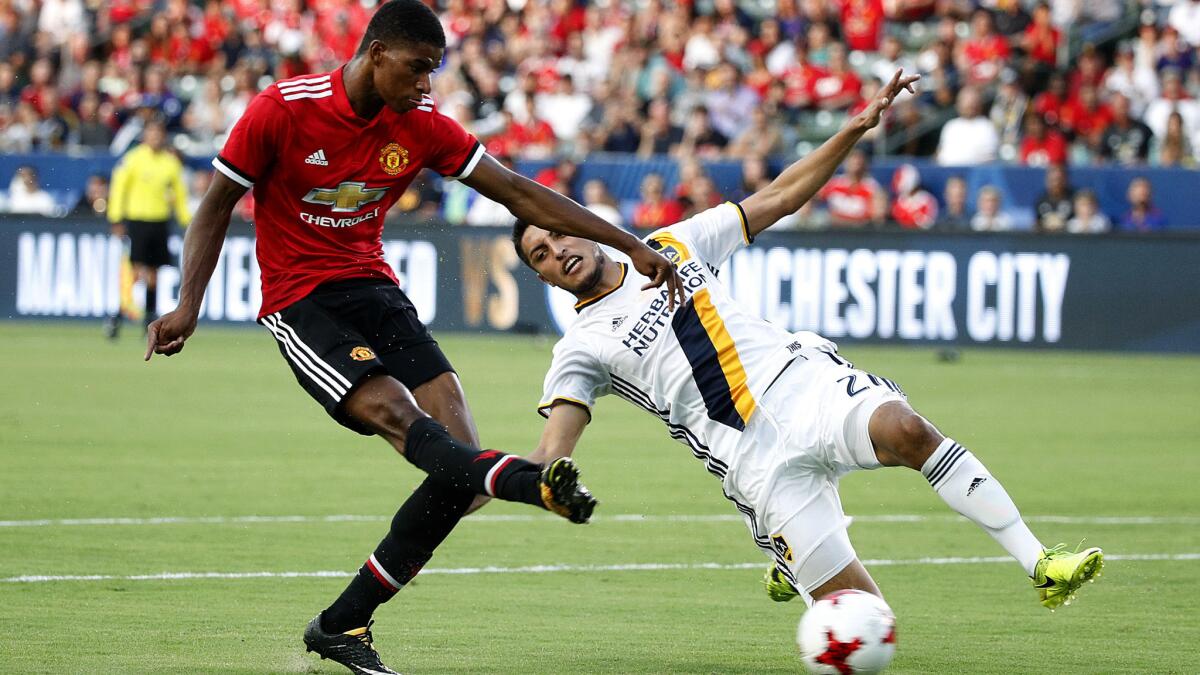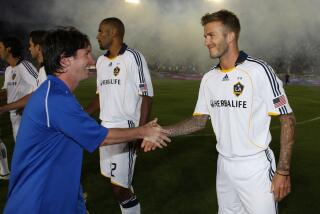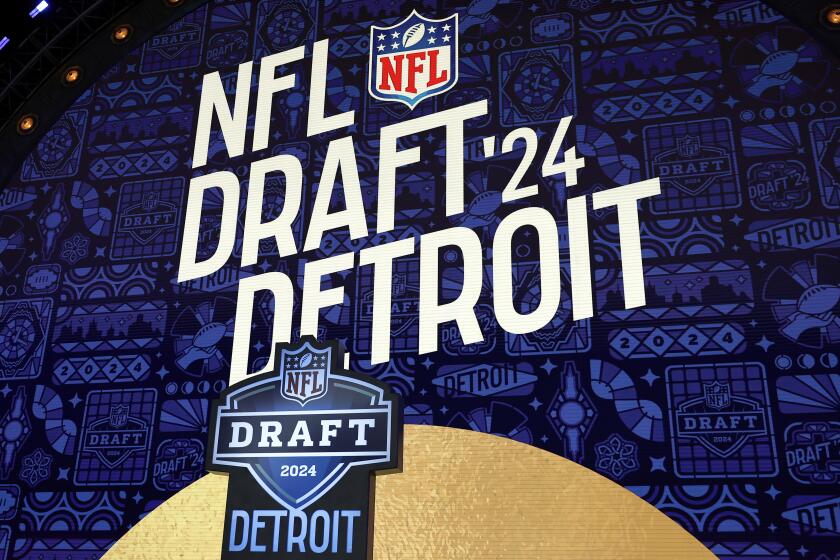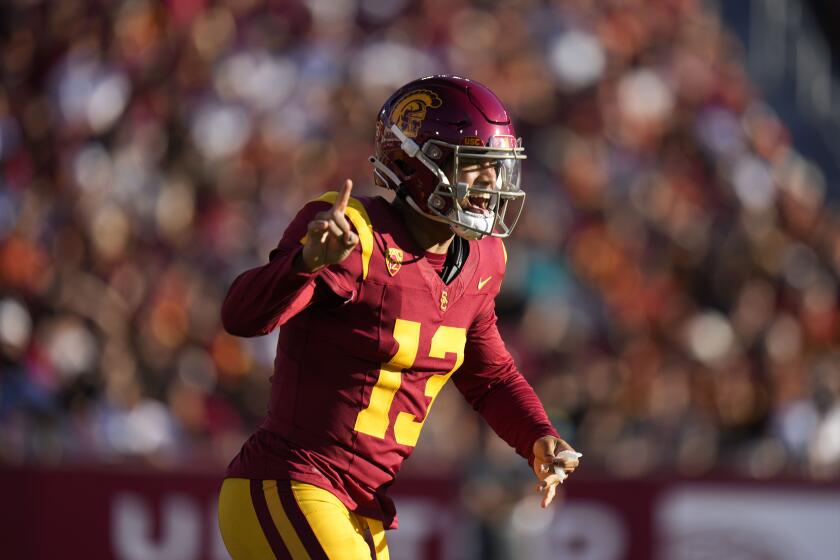Column: No place like home, but U.S. helps put the $ in Manchester United coffers

Manchester United’s sprawling, tree-lined training ground in suburban Carrington, England, is, by all accounts, among the best facilities in soccer.
Behind its well-guarded walls are 14 fields, a gymnasium, indoor running tracks, squash and basketball courts, underwater treadmills, a sauna, seven first-team locker rooms and a $33-million medical facility with a hospital wing and a sports-science department.
Yet it’s abandoned every summer when Manchester United hits the road for its preseason training camp, arguably the most important three weeks of the season.
Last year the team toured China. The two summers before that it visited the U.S.
This month United is back in the Colonies, where it kicked off a five-game exhibition tour Saturday with a 5-2 win over the Galaxy before a red-clad StubHub Center crowd of 25,667 — one that included David Beckham, who starred for both teams.
For much of the night the game was one of men against boys as a veteran Manchester United team toyed with the young Galaxy through the first 70 minutes. With Marcus Rashford scoring twice in the first 20 minutes, the visitors ran out to a 3-0 halftime lead and never looked back.
United, which used 23 players, also got goals from Marouane Fellaini, Henrikh Mkhitaryan and Anthony Martial. Gio dos Santos pulled two of those back in the final 11 minutes for the Galaxy, who, after an exhausting stretch of eight games in 17 days, used the exhibition to test defender Daniel Steres (hamstring) and midfielder Jermaine Jones (knee), both of whom played for the first time since May.
But for United, the foreign trips are about much more than soaking up some sun, checking out the beaches and routing the local MLS team. The financial model of global soccer, one that relies on lucrative commercial deals and multibillion-dollar broadcast fees to support rapidly escalating salaries, demands the world’s biggest clubs make overseas tours every summer to plant the flag, pound some flesh and cash several seven-figure checks during a series of international friendlies.
“Preseason is a mixture of ingredients,” Manchester United coach Jose Mourinho said. “If you stay in Manchester, the facilities obviously are good. But at the same time commercially it is not good.
“And there is another factor that is real important for us, which is the players to be together 24 hours a day. We try to focus just on work and rest.”
Mourinho spoke in front of a colorful banner adorned with the logos of several corporate backers, the most prominent belonging to AON, the global insurance broker that is sponsoring United’s tour. Larger advertising banners circled the team’s temporary home at UCLA’s Drake Stadium.
Manchester United, valued by Forbes at $3.69 billion, may be the third-most-valuable sports franchise in the world but it still needs help paying the bills.
And it’s not alone. Real Madrid, the two-time Champions League winner, was training on an adjacent field at UCLA last week. Nine other European teams — including giants Barcelona, Manchester City, Juventus and Paris Saint-Germain – are also in the U.S., where they are mixing training sessions with equally fatiguing receptions for sponsors, supporters and the media.
They really have no choice. Fan bases in most European countries are largely set; if you’re born into a Manchester United home, you remain a Red for life. And marketing in a neighboring country is equally futile since it’s unlikely a Real Madrid fan in Spain is suddenly going to adopt an English team as her own.
That leaves the U.S. and Asia as the largest and most ripe markets for soccer teams to exploit, which is why Bayern Munich, Manchester City and Barcelona, among others, have all set up permanent offices in New York, Hong Kong, Singapore, Shanghai and Melbourne. Expansion to India likely comes next
“Manchester City is a global brand with a global following,” said Tom Glick, a former minor league baseball, hockey and NBA executive who is now chief commercial officer for the City Football Group. “[But] if you take a look at the followers that Manchester City has, 3% of those followers live in the UK.”
Others have found similar growth outside their home countries. According to statistics provided by sporting goods distributors, Manchester United and Real Madrid both sold more than 2.29 million replica jerseys worldwide last year, an increase of more than 32% over the previous year. In fact, the importance of the international fan base and its purchasing power has become so big, General Motors paid more than $550 million to put the Chevy logo on Manchester United kits at the same time it was pulling the Chevrolet brand out of Europe.
Not everyone appreciates the importance of engaging personally with the global market. Shortly after the curmudgeonly Louis van Gaal took over at Manchester United in 2014, he complained that commercial demands were making it difficult to coach the team.
He is now Manchester United’s former coach.
And Manchester City defender Aleksandar Kolarov, while accepting the importance of the tours, admitted he’s not a fan.
“To be honest, I’d prefer if we could stay here in our training ground because we have great facilities,” he said by phone from Manchester.
In addition to the hassles of travel, though, there’s now the pressure of competition. Summer friendlies in the U.S. used to be low-key events. But this month’s schedule, loosely aligned as the International Champions Cup, will feature matchups between Real Madrid and Barcelona, Manchester United vs. Manchester City and Paris Saint-Germain vs. Juventus.
Twice in the last three summers exhibitions involving Real Madrid have drawn more than 105,000 to Michigan Stadium.
“Those games,” complained Manchester City captain Vincent Kompany, whose team will play Real Madrid at the Coliseum on July 26 “are not as friendly as they used to be.”
Twitter: kbaxter11
More to Read
Get our high school sports newsletter
Prep Rally is devoted to the SoCal high school sports experience, bringing you scores, stories and a behind-the-scenes look at what makes prep sports so popular.
You may occasionally receive promotional content from the Los Angeles Times.







